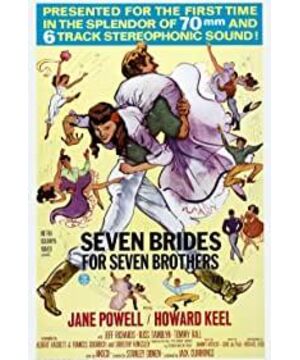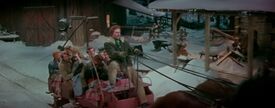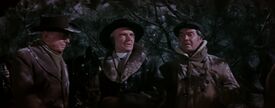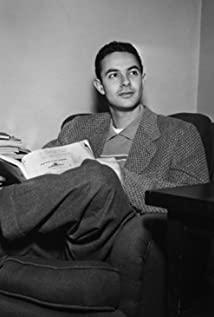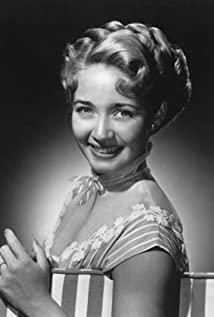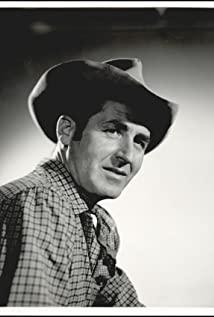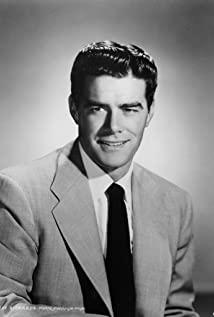French structuralist philosopher Lévi-Strauss found in his research on myth that the study of myth is to find a primitive logic or principles of thinking. One of this logic and principle is binary opposition. Hollywood, the dream factory of the 20th century, has created and produced a large number of genre films, which are a modern interpretation of the logic and principles of ancient myths. Let us try to explore the world of binary opposition in this "myth" by taking the film "Seven Couples" shot by the famous musical director Stanley Dunn in 1955 as an example.
Adam Paraty and his six younger brothers live in a hut on a remote farm next to a desolate forest. Only when it was time to trade crops would Adam go to a nearby town, sell the agricultural and animal husbandry products they produced, and purchase the necessary daily necessities for the seven brothers. Here, the remote farm where the seven Paraty brothers live forms a binary opposition to this relatively prosperous and developed town. The barbarity of the farm and the civilization of the small town are the epitome of this opposition. On the surface, Adam, a man with a bushy beard, seems a little out of tune with the residents of the town, and he doesn't seem to want to have any contact with the residents of the town except for the necessary product transactions. But the problem soon came. There was no woman on this remote farm where the seven brothers lived, and the upright young adults seemed to desperately need a wife. This thorny problem must be solved by Adam as the eldest brother, and he can only find his wife in this small town that is not too far away. Fortunately, Millie, a gentle and virtuous girl in the town, quickly fell in love with Adam at first sight, so Adam happily drove Millie back home.
If the confrontation between the farm and the small town at the beginning of the film is only superficial because of the difference in regions and production methods, then when Millie, as a "civilized person", really lives in a "barbaric" family, we will It can be seen that this opposition is manifested in the psychological consciousness and behavior of the characters. After Millie married into Adam's remote cottage, he unexpectedly discovered that Adam had six younger brothers who were just as savage as he was living with him. And their appearance is dirty and sloppy, their clothes have not been changed for a long time, and they fight every now and then over trivial matters. These are all things that Millie, who is a dignified lady in the small town, cannot accept and tolerate. So Millie tried everything possible to change the bad situation of the seven brothers. She ordered them to change their underwear before they could have breakfast, and taught them the basic etiquette at the table. In order to keep the six brothers from fighting too often, Millie tells them how to behave like a gentleman and how to act to please the girls in the town. It's time to test Millie's "teaching" results when Adam and Millie take their six younger brothers to a luncheon for young people in town. At first, the lads on the farm behaved gracefully, which won the favor of the girls, but soon they got into a fight with the lads in the town, and the lunch meeting ended up in a mess. It can be seen that the small town residents from the civilized world have always harbored deep hostility to the savage brothers in the remote farms, and this hostility is the result of the severe confrontation between civilization and savagery.
In addition to this opposition of civilization and barbarism, the director also shows us a kind of opposition between the sexes, which is reflected in the different attitudes of men and women towards love and marriage. At the beginning of the film, when Adam took his belongings to trade with the shops in the small town, he jokingly said: "Don't you have a wife in the counter here?" The reason why Adam wants to marry a wife is a very important reason. Yes, their seven brothers' house is like a pig's den, and their food doesn't taste good. Adam thinks that finding a wife will probably help them improve this bad environment. It can be said that in Adam's eyes, a wife is more of an object with practical value, rather than an object of sublimation of his love for a woman. But among women, marriage is obviously the product of pure love, and they have very romantic longings for love and subsequent marriage. Millie said on her way home with Adam: "When I was in the inn and heard the men shouting for dinner, I thought how wonderful it would be to cook for just one man. Just for one man!" "It was this different expectation of married life that caused Adam and Millie to have a serious disagreement on their first night of marriage. Millie believed that Adam didn't want a wife," but a cook, a washerwoman, a Maid." And Adam defended: "Life is hard in the wilderness, and of course a man needs a woman who can rely on him to work." Adam and Millie, man and woman, although living under the same roof, guide them to unite in The inner drive to be together is so different. Men long for the benefits of their married wives, while women believe that marriage should only be the result of romantic love. This antagonism between men and women is actually an antagonism between pragmatism and romanticism.
The fusion of binary opposition in musical genre films
In Strauss's study of myth, he not only mentioned the universal existence of the basic law of binary opposition in mythology, but also proposed how myth manipulates and exploits this law of opposition. . He pointed out: "Mythical thinking always starts from the consciousness of opposites and moves towards the solution of opposites." That is to say, myths should not only ask questions, but also solve problems as much as possible.
In Hollywood type film expert Thomas Schatz's monograph "Hollywood Type Films", he divided many Hollywood type films into male-dominated order types and female-dominated fusion types. And this typical Hollywood musical "Seven Couples" undoubtedly belongs to this fusion type dominated by women. This type "usually has a pair (couples) or a group of (usually family) protagonists. Their personal and social conflicts are internalized, translated into emotional vocabulary, and their interpersonal antagonisms eventually succumb to a well-ordered community. Need. Fusion always happens through romantic love. After the initial hostility, the pair find themselves in the final embrace.
" The binary opposites in "Beautiful Couple" are fused. After Adam truthfully expressed the difficult situation of himself and his brothers and the need for a hard-working woman to help him with the housework, he added: "If she has bluer eyes than cornflowers, in the sun Only when her hair is as yellow as wheat will he think he has real happiness." In other words, Adam, as a man who pursues pragmatism, actually has expectations for a beautiful love in his heart. of. The desire to find a hard-working and capable wife who can become his right-hand man in life is just Adam's helplessness as a remote farmer, and every man certainly wants to marry a woman who is not only capable but also beautiful and affectionate. Here, a man's expectation of love (although love is secondary in front of livelihood) well caters to women's need for a tender husband in marriage, so the conflict between Adam and Millie is quickly resolved.
But Adam's six younger brothers were not so lucky. After the failed lunch meeting that ended in a fight, the six younger brothers quickly fell into lovesickness for the town girls. At this time, the eldest brother sincerely said a proverb about love: "Dad said that love is like measles, it usually only comes once in a lifetime, and the older you are, the harder it is to get it." Here we have every reason to believe that, The feelings of the six young and vigorous lads for the town girls are sincere. So, how did these rough and savage boys capture the hearts of a few gentle ladies in a civilized town? At this time, the director introduced the allusions of the ancient Roman Sabine women. The Sabines are an ancient Italian people living in the middle of the Abines Mountains. Romulus, a tribal leader of the Roman Empire, has long coveted the wealth and beauty of the Sabine women. So when the Romans invited the neighboring Sabines to their banquet, they quietly entered the city of Sabine and snatched the young and beautiful women there. So, several brothers followed this ancient legend, sneaked into the town quietly in the middle of the night, and plundered the six sweethearts into a remote farm hut. Here, the six brothers actually took a savage invasion method appropriate to their identities to illegally harass the civilized town. This intrusion exacerbated the already incompatible antagonisms between townspeople and farm brothers.
When the girls in the town were just plundered, they still had very strong feelings of fear and boredom, but in the days of getting along with their brothers day and night, the girls in the town gradually fell in love with the handsome, honest and simple. six brothers. This kind of love is the mutual attraction between young men and women based on instinct and nature. This kind of love overcomes the natural barrier between the brutish young man and the quiet lady, and completes a kind of mutual taming between barbarism and civilization. It can be said that using this lubricant of love to reconcile the opposition between the small town girl and the six brothers is exactly the same as the way of reconciling Adam's practicality and Millie's romance with love. It is a musical (comedy) genre film. An idiomatic way of fusing male and female protagonists in China.
But after taming the town girl, the lads' ordeal doesn't end there. If love can indeed defuse the antagonism between male and female, the antagonism between the civilized way of life of the townspeople and the wanton plundering of women by a few brothers in a remote farm cabin is more deeply rooted. Soon, spring came, and the snow that blocked the connection between the town and the farm melted. The parents and brothers of several girls in the town rushed to the farm, ready to take back these girls who belonged to the civilized town. At this time, the girls had already fallen in love with the boys on the farm, and they did not want to go back to the town with their father and brother. And so the sharp contrast between the town and the farm reappears. At this moment, a miracle occurred. Millie cried out loudly for the baby Adam had just given birth to. All the fathers seemed to think that the baby might be the child of their own daughter. So instead of bringing their daughter back to the town, they brought in the priest and held a fun mass wedding for the farm boy and the town girl. The factor that resolves the contradiction between the town and the farm is actually a newborn baby, and this "impossible" in reality is put into the Hollywood song and dance (comedy) genre, not only can the audience believe it, but the audience will also believe it. The ingenious setting feels witty and fun.
American film critic Molly Haskell once commented on the narrative resolution paradigm of certain melodramas: "So many happy endings, its forced zeal and deft escape only grows the darkness and despair that will follow the marriage The suspicion that comes from this kind of female film is confirmed by careful pretense.” It can be said that the way in which the binary opposition is merged in the Hollywood song and dance film does seem frivolous and evasive, but this type of film is from It has been produced and consumed in large quantities since the 1930s, and it is still prosperous today, which shows its long-lasting classic artistic charm borrowed from the mythological model.
View more about Seven Brides for Seven Brothers reviews


